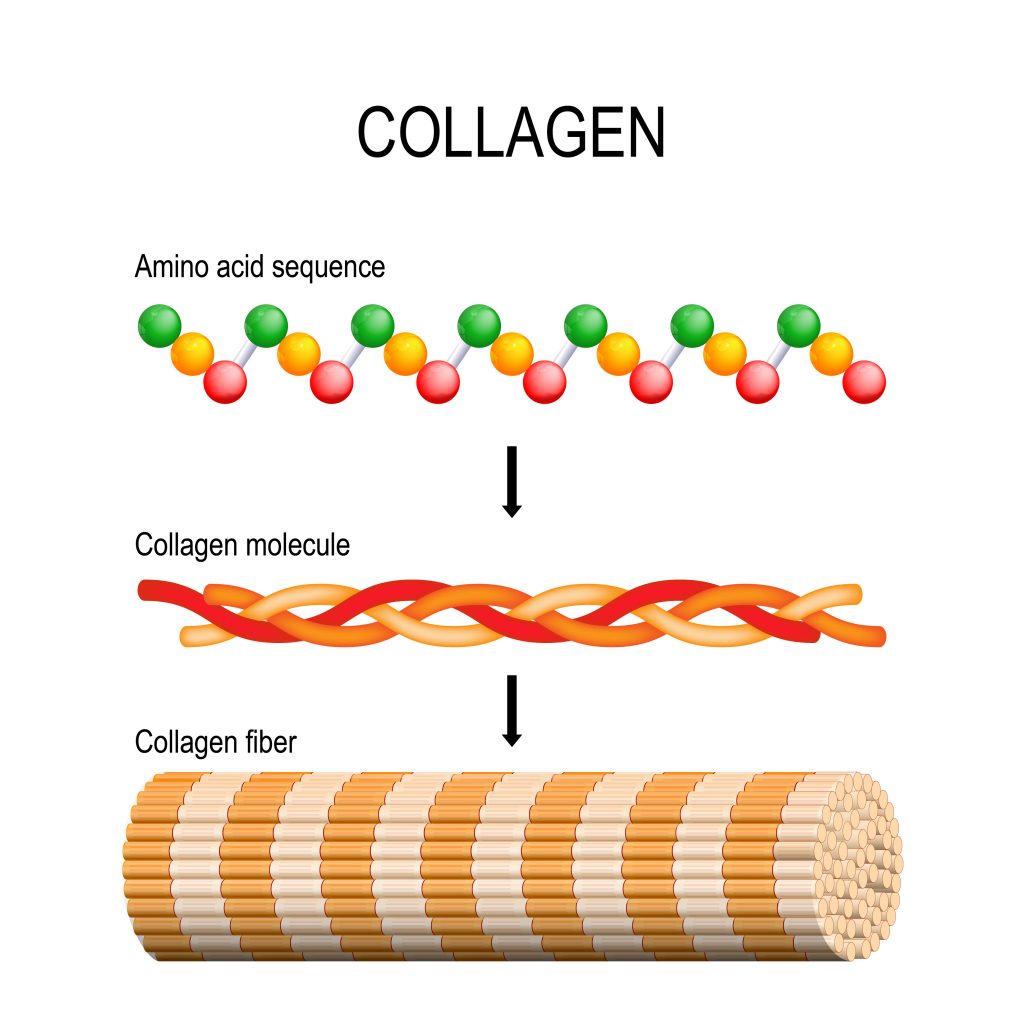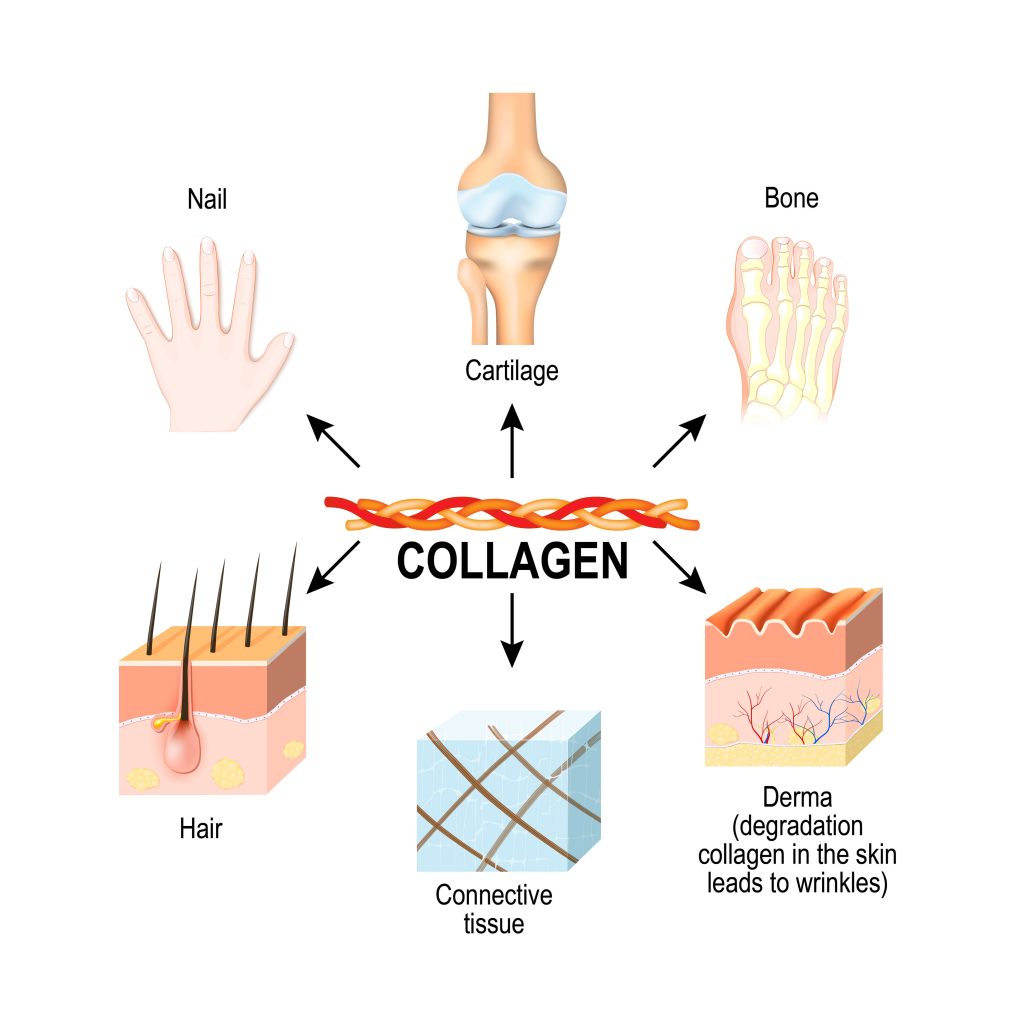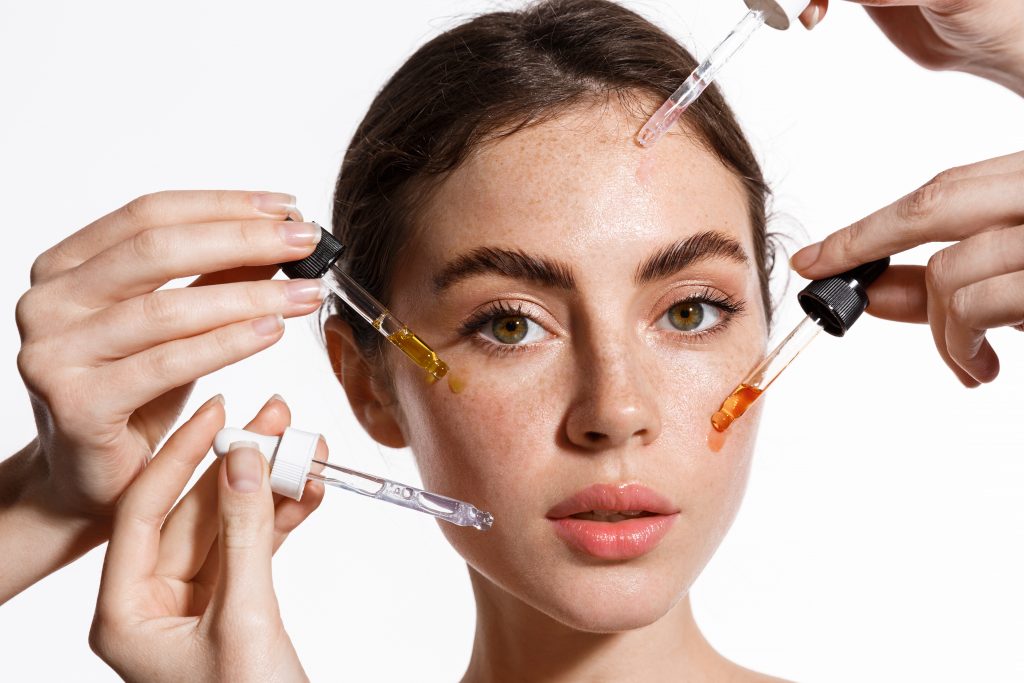Published on February 5, 2021. Last Updated on July 20, 2021.
Surprising Benefits of Collagen for the Hair, Skin, and Nails As Explained By Scientists: Collagen supplements have become exceedingly popular, mainly due to their usage by celebrities and influencers on Instagram.
What Exactly Is Collagen?
Collagen is the most abundant structural protein found in the space outside the cells called the extracellular matrix which supports the structure of the cell and configuration in the connective tissue while performing several other vital support functions. Collagen is the main protein found in the skin which is responsible for its firmness and youthfulness.
The term collagen has become a rather widely used buzzword on products and in the media. This has created some confusion as to what it is, exactly, and how it can be used for antiaging purposes.
Many people are hoping it is possible to actually consume collagen supplements for the renewal of their skin. Due to this reason, the demand for collagen has skyrocketed. Thus it is now being promoted as a key ingredient in many products

How Effective is Oral Collagen Supplements
Collagen has long been considered the fountain of youth by Chinese women. But is it reliable for antiaging and skin rejuvenation purposes? According to some experts, consuming collagen is useless since it is broken down by the body. But in fact, researchers are finding that it is actually okay to take collagen supplements for nutritional and cosmetic reasons. The amino acids resulting from digestive processes actually form new proteins which can benefit the hair, skin, and nails. A newer alternative to conventional supplements is marine collagen which has been shown to be a superior choice for these purposes. Surprisingly, it can certainly be sourced ethically as a cruelty-free option that is much better for the environment.

When questioning the use of collagen supplementation, it does make sense that the digestive system breaks this protein down into a different form that is not equivalent to the collagen actually found in your skin. Reasonably many medical experts actively advocate this perspective to help people make more informed decisions on its usage.
However, researchers are finding evidence for the opposite paradigm. It is possible for a hydrolyzed version of collagen to be broken down by your body and converted into novel proteins that can be safely used by the body and even improve the wellness of your hair, skin, and nails.
Hydrolyzed collagen can be more easily used by the body and broken down into amino acid components which can actually help consumers see a difference in their appearance.
How Collagen Can Help Your Hair Growth

There is very little research that supports a direct relationship between collagen supplements and hair production
However, they can contribute in other important ways to the well-being of your hair. Hydrolyzed collagen can be broken down into components needed to create keratin, the main building block of hair strands. These include proline, glycine, and hydroxyproline.
Hair Anatomy
The hair itself can be thought of in terms of three main structural components.
- the cuticle which is the outer shiny surface
- the medulla, which comprises the central core
- the cortex which abundantly houses keratin fibers and surrounds the medulla center
Collagen can help enrich your body’s supply of keratin so that you can experience healthier, shinier hair growth. There are three primary subtypes to note which comprise 80-90% of our body’s overall collagen.

The Role of Amino Acids
Amino acids are well known to be the building blocks of our proteins structures. However, they do play additional roles in the human body which matters for our health. These include:
- cell signaling
- regulation of gene expression
- proper breakdown of proteins through phosphorylation
Food alone is not sufficient for obtaining all the amino acids you need. Instead, it is possible to compensate for any deficiencies by choosing high-quality supplements with the right combination of amino acids. Pending health issues can be improved through this approach. Likewise, our metabolism also benefits from consuming optimal quantities of the right amino acids [1].
Collagen As An Important Structural Component For Our Hair Follicles And Their Surroundings
Collagen forms an important part of the hair follicle structure, namely where the derma papilla cells reside at the base. It is also needed for the dermal sheath which surrounds the follicular unit consisting of multiple hair follicles grouped as a bundle.
Researchers have found that it is possible for exogenous collagen to promote the repopulation of dermal papilla cells and the regeneration of the dermal sheath.
Another study discovered significant structural changes occurring in the collagen connective tissue surrounding the hair follicle during the anagen growth phase [2]. However, it is uncertain if there is a cause-and-effect relationship between these changes and the initiation of the anagen stage.
The proper development of collagen requires an adequate intake of nutrients and the optimal functioning of cellular metabolism. However, a person’s overall ability to produce collagen will depend on individual factors such as age and genetics.
Collagen As a Potent Antioxidant
Like any other part of the body, hair follicles are also susceptible to oxidative damage caused by free radicals and the signs of premature aging. Which not only affects our cellular tissues but also our DNA [2].
Many people are aware that these issues can be delayed with antioxidant molecules which neutralize these damaging effects. They can be derived from many natural food sources.
However, It is a little known fact that a novel form of collagen sourced from aquatic life can provide powerful antioxidant offerings. Scientists have discovered that fish scales, collagen peptide isolates from certain fish, and even sea cucumbers can protect against oxidative damage and promote antiaging benefits [3] [4] In one particular study, scientists found that collagen sourced from the Croceine Croaker fish was found to have an antioxidant effect comparable to green tea’s ECGC compound.
Collagen For the Skin
Collagen is the most abundant protein found in connective tissues like tissues, bone, and skin. It connects the cells of the extracellular matrix and can be thought of like a glue that holds physiological structures together, giving them their final form and shape.
Collagen makes up about 75-80% of our skin and is responsible for its firmness. It is produced less as we age. As it degrades, skin demonstrates poor elasticity, firmness, and moisture retention.

The Case For Using Supplements to Improve Collagen Levels in the Skin
Dietary sources of collagen peptides are usually not sufficient for restoring the skin’s youthful properties. But do supplements actually work? Many people are placing their hope in this possibility. According to the well-reputed market research firm, Nutrition Business Journal, the collagen supplement will reach $6.5 billion dollars in net worth by 2025.
The notion of taking collagen in the form of supplements is actually not a hoax as many individuals presume. It is true that collagen does get broken down and is not the same as the fibers already in your dermis, However, researchers are finding new forms of evidence that collagen does offer rejuvenating properties for the skin’s surface. Areas that can benefit include firmness, wrinkles, aging, elasticity, density, cellulite, hydration, and wound healing. [[5]
Scientists are now discovering evidence for the efficacy of certain forms of collagen supplements. Notable review findings of different studies described how collagen supplementation offers enormous benefits for cosmetic dermatology. The authors concluded that oral collagen supplements offer viable benefits for both skin aging as well as wound healing.
Other studies were able to highlight additional insights on how this is possible.
Researchers studied 114 women and administered collagen peptides orally to determine their effect on skin aging. They found significant and measurable improvements in skin wrinkles, under-eye appearance, and the rejuvenation of dermal tissue. [6]
Another group of scientists administered oral collagen supplements in a double-blind study to observe their effects on specific skin aging parameters such as skin elasticity, moisture, and roughness. Their results showed significant improvement in skin elasticity. Improvements were also shown for moisture and water loss but were not statistically viable to the extent that it could be generalized across all populations of individuals. However, even these small changes are still noteworthy for future research inquiries. –
A common problem area for many men and women is the loss of volume in the nasolabial region of the face. Researchers discovered that collagen supplementation potentially boosts the body’s own collagen production processes and hyaluronic acid stores to restore density and firmness in these grooves. Their results showed an improvement in the depth of the nasolabial folds as well as other areas such as skin dryness and wrinkles. [7] .
How Collagen Improves Nail Surface Quality
Hair and nails are more similar in their structure and characteristics than most people realize. Both are made of the same type of protein filament known as a-keratin which is bundled into fibers of different thicknesses. These include
- macrofibrils, the smallest
- profibrils, medium
- microfibrils, the largest
Our hair and nails obviously have different textures and overall appearances. This is attributed to how these fibers are configured.
Many women suffer from slow nail growth and quality characterized by brittleness, fragileness, surface roughness, peeling and raggedness. The researchers designed a study which measured improvements for these specific variables, before and after treatment with orally administered collagen. They found improvements along all these parameters. And the subjects expressed complete satisfaction and an overall satisfaction rate of 80% following this clinical trial. [8]
The Ethical Sourcing of Fish For Collagen Supplements
As discussed earlier, aquatic animals byproducts are now being considered as an excellent source of collagen that is effective for improving the hair, skin and nails. Another consideration is that this precious “blue resource” is both biocompatible and is also used quite easily by the body. However, there are ethical and environmental concerns regarding how they are sourced and processed.

Prior to the realization that aquatic animals provide an ideal source of collagen for cosmeceuticals and nutraceuticals, animals like cows, pigs, rabbits and chickens have been relied upon. However, chemical additives are used to ensure their optimal growth size. This presents a major problem for human safety
A major flipside of using cows and pigs for collagen is the risk of transmissible diseases such as mad cow disease.
Despite the fact that marine collagen is now a viable alternative, the issue of environmental pollution deserves great scrutiny.
The fishing industry harvests fish for human and animal consumption. However, only 30% is considered edible. The 70% is discarded as waste which pollutes the environment.
Due to the demand for collagen to be used in nutraceuticals, certain types of fish are killed exclusively for their skin, scales and bones, which raises concerns for animal welfare advocates. However, a more ethical answer to this dilemma lies in the reuse of fish byproduct waste, in part, by using them for producing collagen supplements which reduces their impact on the environment. This approach is now becoming a lucrative industry within the sector of eco-minded consumers and business leaders.
Certain parts of the world limit the number of fish which can be caught for food and other consumables. Spain has thus passed legislation known as TAC (Total Allowable Catch) which restricts the quota of wild caught fish that could be harvested [10]
In conclusion, the use of marine collagen offers tremendous potential for improving the quality of our hair, skin and nails. When used in an all-natural oral supplement, formulated for both quality and efficacy, the overall benefits of this collagen type can be more fully realized. Marine collagen offers men and women who wish to improve their hair, skin, nails and overall health a most optimal nutrient for achieving their objectives. A physician should always be consulted when deciding to use any form of nutritional supplement, whether for health or cosmetic reasons.
Frequently Asked Questions
What are some examples of foods which can improve collagen production in the body?
Successfully collagen production depends on supplying the body with the right building blocks.Typical sources include meat and dairy. Plant-based dieters may want to consider foods like peas, quinoa, tofu, tempeh, soy and legumes.
Should I take collagen supplements with or without food?
Unlike many other nutritional supplements, collagen itself can be taken either with food, or without. Some people find that it is best to take collagen on an empty stomach. When consumed with other foods, the stomach will produce more digestive enzymes which may compromise its effectiveness. It is best to see what works best for your needs. But the choice as to whether or not to consume collagen on an empty or full stomach is ultimately yours.
What dosage guidelines should I follow for taking collagen supplements for the hair, skin and nails?
At the moment, there are no set dosage requirements for collagen supplements. Studies have shown that dosages can range from 2.5 to 10 grams daily. Some products, however, give the recommendation of up to 30 grams a day. Whenever in doubt, your doctor can prescribe the best possible dosage guidelines to meet the demands of your individual makeup.
References
[1] Wu G., Amino acids: metabolism, functions, and nutrition. 2009;37(1):1-17
[2] Ito, M., Sato, Y. Dynamic ultrastructural changes of the connective tissue sheath of human hair follicles during hair cycle. Arch Dermatol Res 282, 434–441 (1990).
[3] Abedin MZ, Karim AA, Latiff AA, et al. Biochemical and radical-scavenging properties of sea cucumber (Stichopus vastus) collagen hydrolysates. Nat Prod Res. 2014;28(16):1302
[4] Abedin MZ, Karim AA, Latiff AA, et al. Biochemical and radical-scavenging properties of sea cucumber (Stichopus vastus) collagen hydrolysates. Nat Prod Res. 2014;28(16):1302-1305
[5] Zhang L, Zheng Y, et.al, The anti-photoaging effect of antioxidant collagen peptides from silver carp (Hypophthalmichthys molitrix) skin is preferable to tea polyphenols and casein peptides. Food Funct. 2017;8(4):1698-1707.
[6] Choi FD, Sung CT, Juhasz ML, et.al, Oral Collagen Supplementation: A Systematic Review of Dermatological Applications. J Drugs Dermatol. 2019;18(1):9-16.
[7] Proksch, E & Schunck, Michael & Zague, V & Segger, Dörte & Degwert, Joachim & Oesser, S. (2013). Oral Intake of Specific Bioactive Collagen Peptides Reduces Skin Wrinkles and Increases Dermal Matrix Synthesis. Skin pharmacology and physiology. 27. 113-119. 10.1159/000355523.
[8] Borumand, Maryam, and Sara Sibilla.et. a; “Daily consumption of the collagen supplement Pure Gold Collagen® reduces visible signs of aging.” Clinical interventions in aging vol. 9 1747-58. 13 Oct. 2014, doi:10.2147/CIA.S65939
[9] Hexsel D, Zague V, Schunck M, Siega C, Camozzato FO, Oesser S. Oral supplementation with specific bioactive collagen peptides improves nail growth and reduces symptoms of brittle nails. J Cosmet Dermatol. 2017;16(4):520-526.
[10] Macy, J. (2018, July 4). Do You Known Where Your Collagen Supplement Is Sourced From? The Answer May Surprise You. Qsilica.Com.
[11] Blanco M, G Sotelo C, I Pérez-Martín R. New Strategy to Cope with Common Fishery Policy Landing Obligation: Collagen Extraction from Skins and Bones of Undersized Hake (Merluccius merluccius). Polymers (Basel). 2019;11(9):1485.
Further Reading
Learn more about how silica from bamboo can improve the condition of your hair and nails
